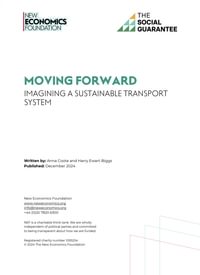Moving forward
Imagining a sustainable transport system
18 December 2024
This briefing paper examines transport in the UK from the perspective of universal basic services (UBS), which makes the case for meeting human needs within planetary boundaries. It considers the implications for transforming the transport system to achieve that goal.
Through the UBS lens, transport is addressed as eco-social policy, where environmental and social interests are pursued together – not as competing forces but as partners that support and reinforce each other. Eco-social policy learns from social and climate sciences and is informed as much by studies of social change and welfare regimes, as by the work of the Climate Change Committee (CCC) and the Intergovernmental Panel on Climate Change (IPCC). We contend that this is the only way to develop policies that address the multiple and interlocking crises we face today.
This is the third in a series of papers that develop the UBS theme, following A Fair Start for All on childcare and early education, and Meeting Needs within Limits, which explores the potential role of public services in achieving environmental goals. Building on ideas and evidence from a wide range of experts across these disciplines, we apply the generic features of UBS to the specifics of transport in the UK, to help map out a pathway towards a sustainable system. Our briefing offers synthesis, questions, and suggestions rather than definitive solutions. It is intended as a resource for those already interested in UBS who want to know more about the implications for transport, as well as for transport experts who want to know more about an eco-social, needs-based approach to universal and sufficient services.
We focus chiefly on passenger rather than freight travel and on five transport modes: buses, trains, cars, planes, and active travel (bicycle, foot, wheelchairs, etc.). (Other modes such as trams and e‑bikes deserve attention, but are beyond our current scope.)
We start by setting out what we mean by meeting needs within limits and the key features of UBS. We then consider the specific characteristics of transport and how these map onto the goal of a universal and sufficient service. We briefly describe the baseline challenge, which is the state of transport in the UK today. We summarise the main transport-related proposals in the government’s year one legislative programme and offer recommendations – first, for transforming the system as a whole and, second, for tackling selected modes of transport. We end with practical examples that show what is already being achieved in the UK and other European countries.
Image: iStock
Topics Transport Public services







